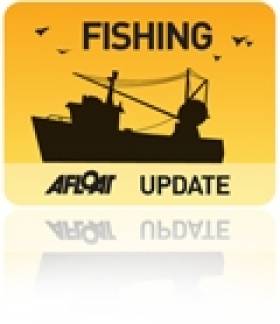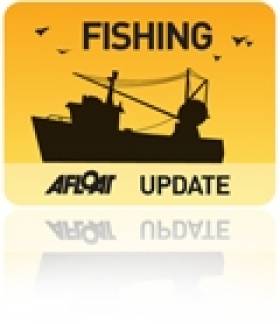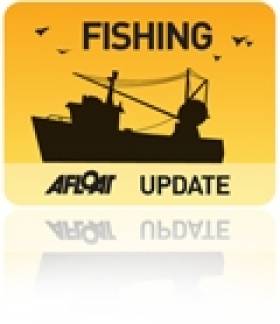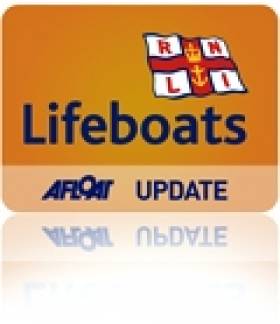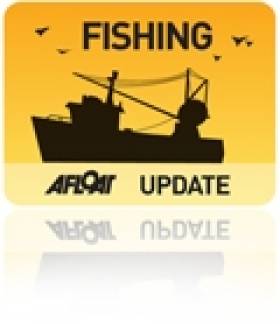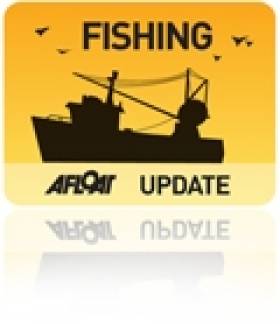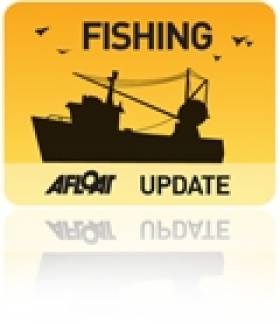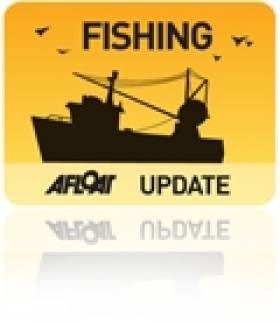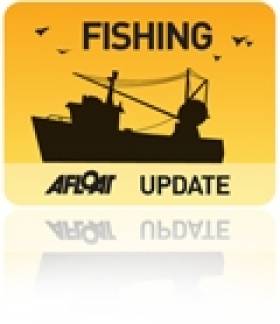Displaying items by tag: Fishing
#Fishing - The captain of a Dutch factory ship has been found guilty by a jury at Cork Circuit Criminal Court of breaching EU sea fishery regulations, as The Irish Times reports.
Klass Dirk Meijvogel was in charge of the Wiron 5, one of two factory ships detained by the Naval Service after a routine inspection off the Blasket Islands on 12 February this year.
Sub Lt Niall McCarthy, who led the Naval boarding party on the vessel, told the court this week that he spotted an automatic grading system installed on Meijvogel's ship.
Systems of that kind allow for separating out smaller and less lucrative fish for dumping back into the sea - contravening EU rules against fish discards.
The Irish Times has much more on the story HERE.
Man Dies After Lobster Boat Incident Off Donegal
#Overboard - Breaking News reports that a man has died after falling overboard from a fishing vessel off Donegal this afternoon (Tuesday 16 June).
The deceased had been working on a lobster boat with a colleague off Horn Head when the incident occurred.
First on scene in the search and rescue operation was the Mulroy unit of the Irish Coast Guard, who recovered him from the water
He was then transferred to the Rescue 118 helicopter for airlift to Letterkenny General but was pronounced dead after arrival.
New Rules For Fish Quotas & Ending Discards Must Be Introduced On Staged Basis Says Minister
#Fishing - Marine Minister Simon Coveney has outlined the major issues of importance for Ireland in the preparation for setting quotas for 2016 following the EU Commission presentation to Council of a policy document on its intended approach to setting fish quotas in 2016.
The Council of Ministers also agreed its position on the proposed regulations for the production and labelling of organic products at today's EU Agriculture and Fisheries Council meeting (Tuesday 16 June). The next step is to secure the agreement of the European Parliament to these proposals.
Speaking earlier today, Minister Coveney welcomed the fact that the state of fish stocks generally is improving and reiterated his commitment that all fish stocks should reach the target of maximum sustainable yield (MSY) by 2020.
He pointed out that “building fish stocks to maximum sustainable yield levels will benefit both the fishing industry and the environment and help secure the future.
"The fishing industry is facing into a period of change with the new policies agreed under the reformed CFP in 2013 now being implemented. The setting of fish quotas in line with new scientific rules is being rolled out and the discards ban for whitefish stocks will commence on 1 January 2016.
"I am working to deliver these new policies on a rational and progressive basis over the next four years so that we deliver fully on the commitment for a new fully sustainable fishing industry by 2020."
The minister added: “We must not apply these new policies as a 'big bang' in 2016. What I am seeking from the EU Commission is a step by step approach which will give industry time to adjust to the new approach.
"If we look to 2020 and beyond I am confident that we will have moved the industry to a much stronger situation with fish stocks rebuilt and the unacceptable practices of discarding fish at sea ended. I made clear to the Commission that 2016 should be an important step on the path and TACs must be set on this stepwise basis, incrementally applying the new scientific rules by setting TACs so as to reach maximum sustainable yields by 2020.”
A discards plan for whitefish stocks in the waters around Ireland has been agreed by EU member states following intensive negotiations chaired by Ireland. The plan, which was developed in consultation with stakeholders, involves the phasing in of the discards ban over the 2016 to 2019 period.
“The first phase of the implementation of the discards ban which comes into effect on 1 January 2016 will require adjustment and changed practices by the fishing industry," said Minister Coveney. "To support operators, the Department [of Marine] and marine agencies will work with them in finding practical approaches to adjust to this new policy and I am making funding available to help them meet the new challenges.”
Referring to the agreement reached on proposed regulations for the organic sector, the minister said he is "delighted we have reached agreement in Council on the regulations for the production and labelling of organic produce.
"This is particularly important for Ireland in light of the numbers who have applied for the Organic Farming Scheme under our Rural Development Programme announced earlier today by my colleague Minister of State Tom Hayes. These regulations provide clear rules for the organic sector and a good basis for negotiations with the European Parliament.”
#Aquaculture - Marine Minister Simon Coveney yesterday (12 June) launched a public consultation on a draft National Strategic Plan for Sustainable Aquaculture Development, proposing 24 actions and initiatives to boost the sustainable growth of aquaculture.
The reformed Common Fisheries Policy requires EU member states to prepare multi-annual national strategic plans to drive forward the sustainable development of aquaculture, and the draft plan launched this week has been prepared in that context.
Commenting on the plan, Minister Coveney said: “Aquaculture is a rapidly growing industry internationally with very rapid expansion opportunities identified over the coming decades to meet the ever growing seafood demand arising from population growth and increased consumption in Asia.
"Aquaculture internationally produced 67 million tonnes of farmed fish in 2012 and it is projected to increase to 85 million tonnes by 2022. That global projection to increase aquaculture production by 18 million tonnes by 2022, puts in context the proposals in the National Strategic Aquaculture Plan to increase Irish aquaculture production by 45,000 tonnes, across all species, by 2023.
"While the targets in the plan are ambitious in the context of the past performance of this industry nationally, they are modest in the context of the global expansion which this industry will experience over the next seven years.”
Minister Coveney added that “our aquaculture industry has long been recognised as an area with potential to grow significant value and employment and to sustainably provide the raw material to enhance our processed seafood exports. Clearly, that has not happened and there are many complex reasons for that.
"At the same time, concerns have been raised about the environmental sustainability of the industry. In this plan, I have sought to identify all of the issues affecting both the growth potential and sustainability of the aquaculture industry and I am proposing a suite of 24 tailored actions to boost sustainable growth, while allaying legitimate areas of concern.
"With these initiatives, I believe we can get our aquaculture sector back on a path of sustainable growth and provide much needed jobs in our coastal communities."
Actions proposed in the draft plan include the introduction of a set of guiding principles for the sustainable development of aquaculture, recommended to the minister by the Marine Institute, together with scale limits and phasing in relation to the development of individual offshore salmon farms, also recommended by the Marine Institute.
Other initiatives include a review of the regulatory framework for aquaculture licensing and associated administrative procedures, and financial supports to build capacity, foster knowledge, innovation and technology transfer and expert advice and training for aquaculture operators in business planning, disease management and environmental best practice.
Submissions on the draft plan and related environmental report and appropriate assessment are invited by 24 July 2015 to [email protected]. Relevant documents are available for download HERE.
#RNLI - Wicklow RNLI assisted two fishermen on a six-metre fishing boat in difficulties off Kiloughter beach on Friday morning (5 June).
The lifeboat, with three volunteer crew, launched at 8.55am following a report that the boat had a rope caught in its propeller.
After locating the fishing vessel drifting four miles north of Wicklow Harbour, they managed to free the rope from the propeller allowing the fishermen to get underway and resume fishing.
The lifeboat crew returned to station once the Irish Coast Guard was satisfied the fishing vessel required no further assistance.
The crew on this callout were helm Graham Fitzgerald, Alan Goucher and Terry Sillery.
Body Of Spanish Fisherman Recovered Off Donegal
#Fishing - The Irish Times reports that a post-mortem will be conducted on the remains of a Spanish fisherman found off the Donegal coast early yesterday (Monday 1 June).
According to The Nationalist, the man was believed to have gone overboard from the Spanish fishing trawler on which he was working on Sunday night.
The body of the 56-year-old was recovered from Killybegs Harbour around lunchtime yesterday after a widespread search by local lifeboats and coastguard, and removed to Letterkenny General Hospital.
Skipper Seeks Costs Over Fishing Offence Aquittals
#Fishing - After two lengthy trials – and two acquittals – a trawler skipper from the Aran Islands accused of breaching fishing regulations is seeking costs against the State, as The Irish Times reports.
Inis Mór fisherman John Conneely was twice taken to Galway Circuit Criminal Court this year over two separate alleged incidences of incorrect log entries for his monkfish catch on dates in 2006.
In the first trial in January, the jury found Conneely not guilty of one breach of EU fishing regulations relating to the strictly quota-managed species – a victim of the widely criticised discards policy.
The second trial last week, over similar alleged offences, saw Judge Rory McCabe direct the jury to find Conneely not guilty of a charge relating to keeping more monkfish on board than allowed by quota.
The Irish Times has more on the story HERE.
#Fishing - Marine Minister Simon Coveney announced on Tuesday (26 May) the introduction of national management measures for razor clams.
The minister brought forward the proposals at the third National Inshore Fisheries Forum (NIFF) meeting, where he announced the introduction of an outtake limit for fishing razor clams in the North Irish Sea of 700kg per vessel per week to take effect from Monday 1 June 2015.
Speaking about the new measures, Minister Coveney said: “At the second NIFF meeting in April, I stated that I would take steps to secure the sustainability of the razor clam fishery, and the new interim measures for the North Irish Sea are a first step in that process.
"I am also conscious that certainty about safe, high quality Irish seafood is important for consumers and for the marketplace. Accordingly, I have decided to introduce national measures to ensure Ireland can demonstrate its commitment to safe seafood.”
The new national measures include:
- Obligations to weigh and report all razor clam landings,
- A requirement to ensure fishing takes place only in shellfish production areas which have been classified for razor clams
- A requirement to fish in only one class of shellfish production area, from a seafood safety perspective, per day, and
- An obligation for vessels in Irish waters to carry GPS tracking equipment from 20 July.
The protection of Natura 2000 sites also featured on the agenda at Tuesday’s meeting, and the minister welcomed support from the NIFF to facilitate stakeholder engagement in preparing mitigation plans for sites with features at risk from certain fishing activities.
“There are features in a number of Natura 2000 sites which are particularly sensitive to certain fishing activities, and we must ensure that the integrity of these Special Areas of Conservation is protected," the minister said.
"Protecting the ecosystems of marine conservation sites preserves the quality of our marine environment and is another step towards harnessing our ocean wealth in a sustainable way.”
The NIFF has been set up to encourage inshore fishing communities to discuss their fishing issues and generate commonly-supported initiatives. Ciaran Quinn of the North West region is the first industry-led chair of the forum, and Eddie Moore of the South West region is the vice chair.
Lobster conservation measures and proposals to manage recreational pot fishing were among the other inshore policy issues discussed by the NIFF members at this week’s meeting.
Invitation To Tender For Boarfish Survey Vessel Charter
#Fishing - The Marine Institute is inviting tenders for the supply of a commercial fishing vessel to conduct a boarfish acoustic survey in ICES divisions VII b, c, g, h, j & k (west of Ireland, Celtic Sea and northern Biscay).
The vessel would be chartered for a period of 21 days to survey spawning aggregations of boarfish – a big seller for Ireland in the Chinese market – using hydro-acoustic techniques.
Vessels are invited to tender on the basis of their ability to undertake the survey schedule. This comprises following a pre-determined cruise track in the order of 3,200 nautical miles carried out over 21 days with 20hr operations (4am-midnight) and with directed trawl stations on fish schools of interest as and when required.
A single pelagic midwater trawl with a vertical opening of greater than 40m and contain a 20mm codend liner and/or sprat brailer will be a requirement for the survey. A liner can be provided if required but all other associated fishing equipment must be provided by the vessel.
The survey will be timed to coincide with the southerly end point of the RV Celtic Explorer on 10 July 2015 and this survey will act as a continuation. It is therefore essential that the charter vessel is out on the water and ready to begin surveying no later than midnight on 9 July 2015.
Detailed information of the track and survey plan will be provided by the Marine Institute. The successful applicant will be selected based on technical suitability, cost of charter, pelagic fishing track record and previous experience in scientific research and surveys.
The closing date for tenders is this Friday 29 May 2015 at 12 noon. Full details of the tender are available in a PDF to read or download HERE.
Campaign Against Galway Bay Fish Farm Blasts PR Spend
#FishFarm - Bórd Iascaigh Mhara (BIM) has been blasted by campaigners against its proposed Galway Bay salmon farm for spending tens of thousands of euro on PR for the controversial project.
According to the Connacht Tribune, Galway Bay Against Salmon Cages described as "worrying" the more than €57,000 paid to PR firm Keating & Associates for "communications service", just one of various spends on private consultants totalling more than half a million euro.
The group also expressed concern over letter sent on behalf of BIM to the editors of national newspapers, citing them as an effort to "stifle debate".
However, BIM says the letters were issued "in order to address the publication of inaccuracies regarding BIM and the Galway Bay application".
It also defended the expenditure on consultants as normal operating costs, claiming it regularly hires outside expertise when needed.
Local groups opposed to the 500-hectare salmon farm off the Aran Islands – which would be largest aquaculture project of its kind in Europe – continue to wait for Marine Minister Simon Coveney to make a decision on BIM's licence application, which was originally promised before this summer.
The Connacht Tribune has more on the story HERE.


























